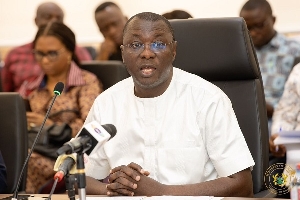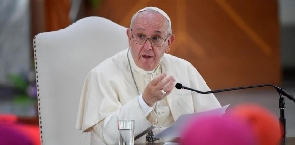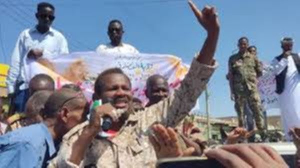Finance Minister Dr. Mohammed Amin Adam has assured that government is pushing forward with its debt negotiations, determined to reach an agreement with its creditors that is acceptable to all parties while staying within the sustainability targets of its IMF-supported economic programme.
Ghana is aiming to cut US$10.5billion from its external debt repayments and interest costs due from 2023 to 2026. It reached an agreement in principle in January to rework US$5.4billion of loans with official creditors, which will need to confirm that the bondholder deal is comparable to what they offered.
In a joint press conference on the second review of the IMF-supported Post-COVID-19 Programme for Economic Growth (PC-PEG), the minister emphasised the government’s commitment to securing a deal that aligns with the programme’s objectives.
“We are mindful about the fiscal targets and the sustainability targets because we do not want to reach a deal which falls outside the programme targets for sustainability,” Dr. Adam stated, adding: “This is guiding all the negotiations that we are doing with our bondholders.”
The minister acknowledged the ongoing nature of the negotiations, stating that over the last two months, the government has been “more aggressive” in its talks with commercial creditors and Eurobond holders.
He expressed confidence that a deal can be reached, but reiterated the importance of staying within the programme’s parameters.
“We are determined to continue to negotiate to the level where we can have a deal that is acceptable to all of us, but that also does not deviate from the programme targets for sustainability,” Dr. Adam said.
Debt treatment talk derails
Nonetheless, reports by Reuters on Monday indicate that the nation failed to strike a deal with two bondholder groups to restructure US$13billion of international bonds. Talks were derailed for now amid indications from the International Monetary Fund (IMF) that the deal would not fit its debt sustainability parameters, which set out how much debt it thinks a country can afford.
Ghana had been in formal talks with two groups holding its international bonds since March 16 – one “international” group of western asset managers and hedge funds and another one including regional African banks. The regional African bondholder group had also rejected part of the proposed rework, including a “PAR option” to retain the original value of the bonds with a longer maturity and lower coupon.
Next step for disbursement
The successful completion of the second review of the IMF-supported programme marks a significant milestone for Ghana. According to Mr. Stéphane Roudet, the IMF’s Mission Chief for Ghana, the next key step is for the country to reach an agreement with its official bilateral creditors on a Memorandum of Understanding (MoU) for debt treatment, in line with the programme’s parameters.
“Given Ghana’s strong progress under the IMF-supported programme, the next key step for the country is to reach an agreement with its official bilateral creditors on an MoU consistent with the terms agreed in January 2024,” Roudet said. “We look forward to the authorities’ continued efforts to reach an agreement with all creditors in line with programme parameters.”
The successful negotiation of the MoU with official bilateral and commercial creditors would provide the necessary financing assurances for the IMF Executive Board to consider and approve the second review of Ghana’s three-year programme under the Extended Credit Facility. This would, in turn, unlock the disbursement of the third tranche of US$360million under the programme, subject to the board’s favourable consideration.
As the government continues its debt restructuring efforts, the Minister for Finance reiterated the importance of maintaining the programme’s sustainability targets.
“We are mindful about the fiscal targets and the sustainability targets because we do not want to reach a deal which falls outside the programme targets for sustainability,” Dr. Adam said.
Business News of Wednesday, 17 April 2024
Source: thebftonline.com

















